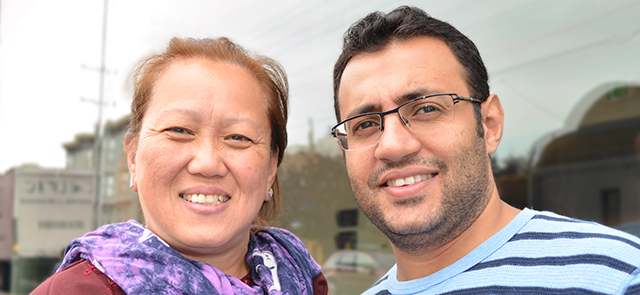 After just five years, MEDA now runs the largest free tax preparation program in San Francisco. While things are super busy during the first part of the year, with everyone trying to meet the April 15th filing deadline, there are still plenty of clients coming through the doors of Plaza Adelante, the Mission neighborhood center, throughout the rest of the year.
After just five years, MEDA now runs the largest free tax preparation program in San Francisco. While things are super busy during the first part of the year, with everyone trying to meet the April 15th filing deadline, there are still plenty of clients coming through the doors of Plaza Adelante, the Mission neighborhood center, throughout the rest of the year.
The client need
The majority of tax clients who come to MEDA, and its three other Volunteer Income Tax Assistance (VITA) sites, are low-income—very low-income, actually, especially when compared to San Francisco’s median household income of over $70,000.
The numbers tell the story: 92 percent of MEDA’s clients are defined as low- to moderate-income, based on the latest Housing and Urban Development (HUD) San Francisco Area Median Income (AMI) levels.
Tax Program Manager Max Moy-Borgen explains, “We have often seen that the paid tax preparers that our families seek out are focused on higher-earning individuals. This means preparers may not have known about certain credits or may have not correctly filed the taxes. Knowing the IRS laws, specifically as they meet the needs for our families, from tax credits to allowable deductions, is what allows our team to maximize refunds for our community. Some clients get 25 percent of their yearly income back as a refund. This money is vital for these families.”
Most refunds come from the Earned Income Tax Credit (EITC), a refundable tax credit for low- to moderate-income working individuals and couples. The amount of EITC benefit depends on a recipient’s income and number of children. The MEDA tax team is well versed in the EITC, plus all of the tax credits available to the low-income community.
One perk of taxes being done at MEDA is that every tax return is checked by two preparers, as mandated by the VITA program.
“It is always good to have a second set of eyes to look at the numbers. This doesn’t happen at some tax services. We correct a number of returns that were incorrectly prepared elsewhere,” states Moy-Borgen.
A multi-generation approach to services
Bilingual Bank Teller program graduate Angelica Colon-Chin, now starting a successful career as an employee of Wells Fargo at its downtown San Francisco branch, needed to do her taxes last winter. That’s when Technology Training Manager Leo Sosa advised Angelica to head over to the “Taxes Plus: Go Further With MEDA!” room at Plaza Adelante, where her taxes could be prepared at no cost.
The young adult then told her aunt to do the same. So, Laurie Chin and Maged Nabawy headed over from their nearby Mission District residence to Plaza Adelante. While calculating their current year’s taxes, the astute preparer realized that the prior two years’ returns should be amended: it turns out that the prior tax preparer did not take into account the IRS’s “Nonresident Spouse Treated as a Resident” rule. This rule states that if, at the end of your tax year, you are a U.S. citizen or resident alien (even if you were not for the whole year) and married to a nonresident alien, you can choose to treat your nonresident spouse as a U.S. resident for U.S. Federal Individual Income Tax purposes.
This is an especially smart move if the overseas spouse did not have much income. Such was the case with Maged, who had been working in his native Egypt since 2011. When Maged’s income was added to Laurie’s earnings, they then got two times the standard deduction and personal exemptions on federal and state returns. The result? A $2,585 refund!
In this couple’s case, MEDA also worked with the nonprofit Bay Area Communication Access, as Laurie and Maged are both deaf and needed an interpreter for their tax sessions.
Laurie speaks of her experience at MEDA as follows: “Everyone was so nice. They set up an interpreter service for us, which was great. I was surprised at how easy the tax preparation was and it was amazing that it was free.”
It’s interesting to note that Laurie’s sister, Florence, later came to one of MEDA’s monthly Housing Opportunities sessions, this one a free workshop for first-time homebuyers.
This story showcases the service-integration model at MEDA’s SparkPoint center. It also exemplifies how a community of support can better lives, as it did for this family from the Mission Promise Neighborhood (MPN) footprint. MPN works on a two-generation approach, helping families succeed so students achieve. In the case of this family, that became a three-generation approach.
“For our tax team, helping families likes this makes our jobs meaningful. This family can take their $2,500 refund and start building assets. That’s what it’s all about at MEDA,” concludes Moy-Borgen.
Read MEDA’s free tax program stats.






Leave a reply